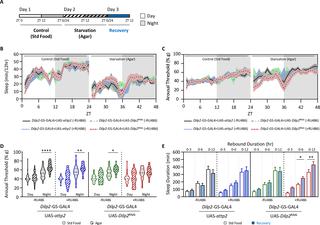PLOS Genetics ( IF 4.0 ) Pub Date : 2020-03-11 , DOI: 10.1371/journal.pgen.1008270 Elizabeth B Brown 1 , Kreesha D Shah 1, 2 , Richard Faville 3 , Benjamin Kottler 3 , Alex C Keene 1

|
Sleep is a nearly universal behavior that is regulated by diverse environmental stimuli and physiological states. A defining feature of sleep is a homeostatic rebound following deprivation, where animals compensate for lost sleep by increasing sleep duration and/or sleep depth. The fruit fly, Drosophila melanogaster, exhibits robust recovery sleep following deprivation and represents a powerful model to study neural circuits regulating sleep homeostasis. Numerous neuronal populations have been identified in modulating sleep homeostasis as well as depth, raising the possibility that the duration and quality of recovery sleep is dependent on the environmental or physiological processes that induce sleep deprivation. Here, we find that unlike most pharmacological and environmental manipulations commonly used to restrict sleep, starvation potently induces sleep loss without a subsequent rebound in sleep duration or depth. Both starvation and a sucrose-only diet result in increased sleep depth, suggesting that dietary protein is essential for normal sleep depth and homeostasis. Finally, we find that Drosophila insulin like peptide 2 (Dilp2) is acutely required for starvation-induced changes in sleep depth without regulating the duration of sleep. Flies lacking Dilp2 exhibit a compensatory sleep rebound following starvation-induced sleep deprivation, suggesting Dilp2 promotes resiliency to sleep loss. Together, these findings reveal innate resilience to starvation-induced sleep loss and identify distinct mechanisms that underlie starvation-induced changes in sleep duration and depth.
中文翻译:

果蝇胰岛素样肽2介导饮食调节睡眠强度。
睡眠是一种近乎普遍的行为,受多种环境刺激和生理状态调节。睡眠的定义特征是剥夺后的体内稳态反弹,其中动物通过增加睡眠时间和/或睡眠深度来补偿失去的睡眠。在果蝇,果蝇表现出剥夺后强大的恢复睡眠,并代表了研究调节睡眠稳态的神经回路的强大模型。在调节睡眠稳态和深度方面已经发现了许多神经元种群,这增加了恢复睡眠的持续时间和质量取决于诱发睡眠剥夺的环境或生理过程的可能性。在这里,我们发现与通常用于限制睡眠的大多数药理和环境操作不同,饥饿有效地导致睡眠丧失,而随后的睡眠时间或深度没有反弹。饥饿和仅蔗糖饮食都会增加睡眠深度,这表明饮食蛋白质对于正常睡眠深度和体内平衡至关重要。最后,我们发现果蝇胰岛素样肽饥饿引起的睡眠深度变化而不调节睡眠时间是急需的2(Dilp2)。缺乏Dilp2的苍蝇在饥饿引起的睡眠剥夺后表现出代偿性的睡眠反弹,这表明Dilp2促进了睡眠丧失的适应性。总之,这些发现揭示了对饥饿引起的睡眠丧失的天生适应力,并确定了导致饥饿引起的睡眠时间和深度变化的独特机制。










































 京公网安备 11010802027423号
京公网安备 11010802027423号